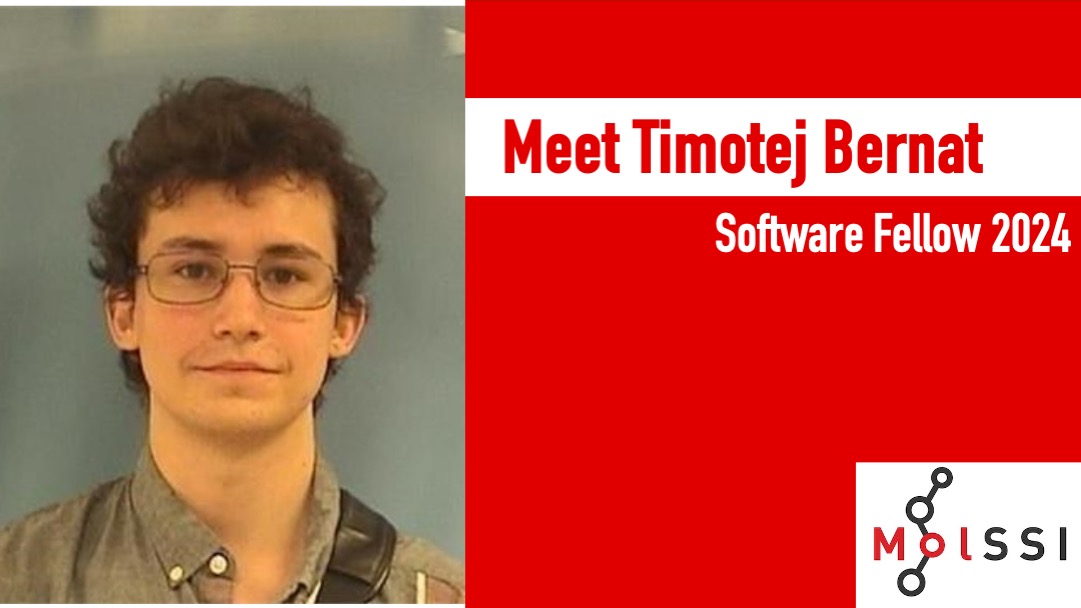
Timotej Bernat: Bridging Chemistry, Software, and Open-Source Innovation
Timotej Bernat, currently a PhD student at the University of Colorado Boulder under the direction of Prof. Michael Shirts, first became intrigued by computational chemistry during his undergraduate studies. After being introduced to organic chemistry, he found himself fascinated by the intricate, interconnected nature of the field. Once beyond the outward-facing veil of difficulty of the field, Tim began to see chemistry not just as a discipline of arbitrary rules, but as a powerful framework for understanding the patterns behind real-world molecular behavior.
Tim’s passion for software development is not just theoretical. During his final undergraduate year, he undertook a 14-month internship at Sandia National Laboratories, where he developed both the graphical user interface (GUI) and backend systems for a software tool which automated defect analysis in silicon wafer devices. This software has had a tangible impact on semiconductor manufacturing, informed process improvements that enhanced device yield and accelerating the process of introducing process changes; to this day, the software remains in active use at Sandia’s silicon processing facility.
Tim has been deeply involved in scientific computing, particularly in the development and distribution of molecular modeling software. He has recognized a critical gap in many chemistry-focused academic programs: while students are often taught to write code, there is little emphasis on writing good software—code that is maintainable, well-documented, and easily distributable. His tenure with the MolSSI as a Software Fellow has been instrumental in bridging this gap. Under the mentorship of Software Scientist Dr. Sam Ellis, he has gained hands-on expertise in packaging and distributing Python code, learning best practices that go beyond what is trained in most research labs.
As a MolSSI Software Fellow and PhD candidate, Tim is developing methods and software which enable automated, high-throughput classical molecular dynamics (MD) simulations of organic polymer systems. Polymer design is central to problems in many active research areas including plastic upcycling in sustainability research, polymer-biopolymer compatibilization in biomedical engineering, and self-healing of dynamically covalent polymer networks in functional material design. Systematic exploration of chemical and morphological design spaces through experiment alone is practically infeasible and requires assistance from computational structure-function models. Machine learning models are a popular choice for such models but are similarly constrained by lack of comprehensive experimental property datasets. However, both limitations can be overcome by physics-based molecular dynamics simulations, which are significantly cheaper to run than an experiment and more interpretable than a machine learning model.
That said, no cohesive software ecosystem currently exists for representing and preparing arbitrary covalently-bound polymer systems for MD simulations. Tim’s research addresses this deficiency by designing systematic methods for constructing polymer systems and by developing software that makes these methods accessible to researchers in polymer-adjacent disciplines. His efforts have materialized into two collaborative polymer-related projects.
The first, Polymer Inverse Design (PolyID), is a sustainability-focused collaboration with the National Renewable Energy Laboratory (NREL) aimed at discovering biomass-derived replacements for petroleum-based plastics. For this project, he has developed high-throughput workflows that generate polymer structure and MD simulation files for thousands of unique polymer preparations, requiring only monomer chemistry and polymerization mechanism information from a chemical database as input. These files are then used to run simulations, producing complete physical property datasets for training graph neural networks for thermophysical property inference.
The second project, Multiscale Polymer Toolkit (MuPT), is an infrastructure-driven, multi-research group collaboration focused on developing software for representing polymers and co-molecules at the atomic, molecular, and nanoscale levels. The toolkit will provide APIs that interface with existing molecule-building, parameterization, and simulation tools. Tim’s contributions have centered on the development of the polymerist Python library, which, among many other packages developed and maintained by collaborators, will eventually be integrated into the MuPT ecosystem.
Looking ahead, Tim plans to continue developing application-driven, open-source molecular software, either in a national research laboratory or in an industry setting where creativity and knowledge-sharing are valued. His MolSSI fellowship project, focused on distributing a multiscale polymer modeling software, is a step toward this goal. He hopes the software will become widely adopted in the field, fostering collaboration and innovation.
Beyond research and software development, Tim finds pleasure in music. A lifelong musician, he has played the saxophone, bassoon, and piano, embracing both jazz and classical styles. He also enjoys unwinding with a good book, a pursuit that complements his scientific explorations.
With a unique blend of chemistry, coding, and creativity, Tim is set to make meaningful contributions to both scientific software and the broader research community. If you are interested in more of Tim’s work, check out his GitHub page
